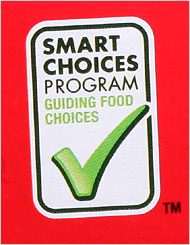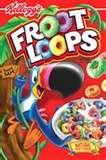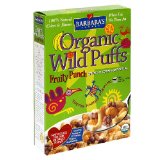 A recent New York Times article describes the latest health fraud against our children. Evidently Froot Loops has received the Smart Choices label for being a nutritious choice for breakfast. Never mind that Froot Loops are 41% white sugar. For years I have been on a crusade against artificial food coloring and flavoring. So when this news came out, I decided it was finally time to share the research about the harmful effects of these petrochemical food additives.
A recent New York Times article describes the latest health fraud against our children. Evidently Froot Loops has received the Smart Choices label for being a nutritious choice for breakfast. Never mind that Froot Loops are 41% white sugar. For years I have been on a crusade against artificial food coloring and flavoring. So when this news came out, I decided it was finally time to share the research about the harmful effects of these petrochemical food additives.
This new food-labeling campaign is called Smart Choices and is backed by most of the nation’s largest food manufacturers, like Kellogg's which makes Froot Loops. Supposedly it is “designed to help shoppers easily identify smarter food and beverage choices.” What is smart about a cereal in which the primary ingredient is sugar, and which contains artificial food coloring that is proven in Europe to cause cancer and behavioral problems in children? Obviously it is a marketing campaign to keep mainstream America interested in junk food as the public consciousness around nutrition becomes more sophisticated and informed.
The BBC is at the forefront of media that is exposing the harmful effects of food coloring. In the U.K., regulations have been put in place to limit food coloring because of studies that show how child behavior is negatively affected by consuming it. The Food Standards Agency, the U.K.'s version of our FDA, performed a study of 300 children ranging in age from three to nine. It concluded that the children behaved more impulsively, exhibited hyperactivity, and lost concentration after consuming a drink containing food coloring. Now large food production companies are changing their recipes to omit food coloring because of the bad press it is getting.
One of the best resources for information about child behavior and food additives is the Feingold Association. Dr. Ben F. Feingold was an eminent pediatrician and allergist, and was Chief of Allergy at the Kaiser Permanente Medical Center in San Francisco. As early as 1968, he was publishing articles about the dangers of food additives, and making their connection to learning disabilities. Today the Feingold Association guides families of children with behavioral and learning challenges toward a diet free of artificial colorings, flavorings and preservatives.
 Their website, www.feingold.org, offers a wealth of information and FDA research about the carcinogenic and behavioral side effects of these petro-chemical based food additives. The organization supplies families with shopping guides so that they can navigate their way down the aisles of conventional grocery stores to avoid these chemicals. One thing Feingold stresses is that these additives are not only found in food. They are in many toothpastes, bubblebaths, shampoos, and soaps. Kids who are sensitive to food coloring in food will also react to it topically. Put one of these kids in a bath full of red dye # 40, and you'll have a terrifying tantrum that could last all night. Just some of the behavioral, health and psychological symptoms that the Feingold diet can help are: insomnia, frequent crying, asthma, hyperactivity, depression, eczema, sensory integration disorder, ADHD, and learning disabilities.
Their website, www.feingold.org, offers a wealth of information and FDA research about the carcinogenic and behavioral side effects of these petro-chemical based food additives. The organization supplies families with shopping guides so that they can navigate their way down the aisles of conventional grocery stores to avoid these chemicals. One thing Feingold stresses is that these additives are not only found in food. They are in many toothpastes, bubblebaths, shampoos, and soaps. Kids who are sensitive to food coloring in food will also react to it topically. Put one of these kids in a bath full of red dye # 40, and you'll have a terrifying tantrum that could last all night. Just some of the behavioral, health and psychological symptoms that the Feingold diet can help are: insomnia, frequent crying, asthma, hyperactivity, depression, eczema, sensory integration disorder, ADHD, and learning disabilities.
For families that live near a Whole Foods or other health food store, it is really quite easy to grocery shop. Whole Foods has a policy of not allowing these artificial food additives, so pretty much everything on the shelves there is ok. Trader Joe's unfortunately is not as vigilant. If you choose to avoid these chemicals, you have to become a very careful ingredient reader. But this takes very little time and effort. What parent would not want to try adjusting their child's diet before putting them through other rigorous medical tests and eventually end up on medication? And what school would not want to have calmer, more attentive students?
Despite the obvious rational answer to these questions, strangely there is much resistance to eliminating food coloring. "It's fun!" is one I heard at my son's preschool years ago. "Oh, it makes them stronger!" I've heard too. My philosophy is this: We are our children's guardians and protectors. We feed them, so it is up to us to provide them with the healthiest nutrition possible so that they can function optimally, enjoy life, and grow into the best possible people they can be. Contrary to popular belief, I feel our children should be sensitive to harmful chemicals. If they are not, either someone isn't paying attention to the symptoms, or the child is already so toxic that their body has adapted to it and has developed a tolerance to hide the symptoms. A sensitive body is an honest body. My son's body screamed "No!" when he ate purple frosting at a birthday party. He suffered with a stomach ache and headache that I'd not wish upon anyone, but at least his body was sending a loud and clear message!
No parent would willingly expose their child to physical harm. Yet ignorance of the serious side effects of these common and industry-endorsed food additives effectively does just that. And now there's really no excuse. There are alternatives to everything these days. You can now buy "natural" gummy bears that are colored with beets and carrots. Even if you don't have a health food store nearby, they can be purchased online. While it's true that the natural versions are more expensive than the junky ones, I'd rather pay for it now than later at the doctor's office or the hospital. It's called preventative medicine.
 So I've finally unveiled my crusade against food coloring and it feels great. It's been kind of low key for the past few years, but now it's really out there. I do feel it's that important. I do feel the chemicals are hideous and horrible and have no right being associated with food. I'll allow it in my homemade play-dough, but if the kids want Froot Loops, they're getting Barbara's Organic Wild Puffs Fruity Punch! That's if they're really lucky.
So I've finally unveiled my crusade against food coloring and it feels great. It's been kind of low key for the past few years, but now it's really out there. I do feel it's that important. I do feel the chemicals are hideous and horrible and have no right being associated with food. I'll allow it in my homemade play-dough, but if the kids want Froot Loops, they're getting Barbara's Organic Wild Puffs Fruity Punch! That's if they're really lucky.
None of us likes to be the party pooper. Sometimes at my kids' friends' birthday parties I let it fly, against my better judgement. Does your child exhibit a sensitivity to particular chemicals? How do you deal with it in social situations? I'd love to hear how other parents keep their kids on track when other pressures make it difficult. Comment here to discuss it!
